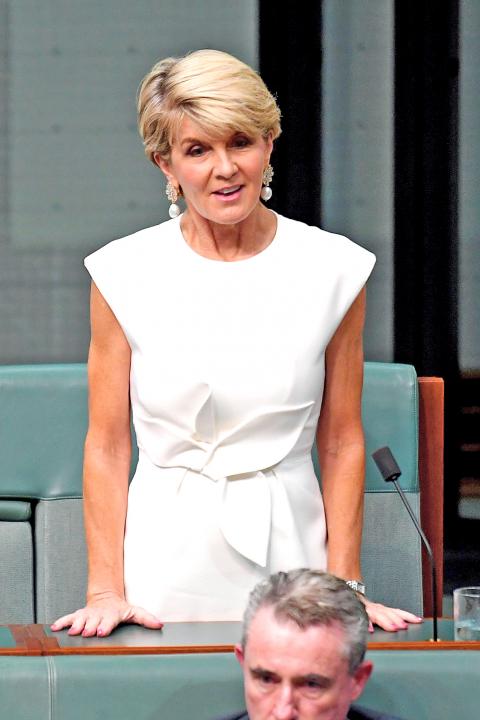Former Australian minister for foreign affairs Julie Bishop is to retire at the next election, she said yesterday, joining a wave of lawmakers leaving a government that faces defeat in the poll, which is due by May.
The departure of one of Australia’s most popular and high-profile female lawmakers follows four government legislators either retiring or defecting from the ruling center-right coalition, which is in a minority and trailing in polls.
Two other female members of the Australian Liberal Party have also left amid claims of disunity, bullying and intimidation, although Bishop praised the government in her retirement speech.

Photo: EPA-EFE
“It is my view that the Liberal-National coalition will win the next election, because it is focusing on the things that matter to the Australian people,” Bishop told parliament, listing policy achievements from the economy to security.
“And on that basis, I have reconsidered my position... I will not recontest the seat of Curtin at the next election,” she added.
Bishop has represented Curtin, Western Australia, since 1998. She was foreign minister from September 2013 to August last year and deputy leader of the Liberal Party, which governs in coalition with the Australian National Party.
The timing of Bishop’s departure heaps pressure on a government that is lagging in opinion polls — although the gap has narrowed of late — and battling a perception that it is out of touch, especially with female voters.
“Bishop will take a large number of votes with her,” said Haydon Manning, a politics professor at Flinders University in South Australia. “There will be people who would have voted for Bishop, no matter what. Those will now be open to the opposition Labor Party.”
Last month, Australian Minister for Women Kelly O’Dwyer said that she would retire, after backbencher Julia Banks quit the party late last year to sit as an independent, protesting against its treatment of women, and policies on energy and climate change.
Bishop, who resigned from both her posts after a backbench revolt in August last year forced then-Australian prime minister Malcolm Turnbull from power, was defeated in a party vote to replace him, with then-Australian treasurer Scott Morrison succeeding Turnbull instead.
Morrison and Turnbull both praised Bishop.
“You have been our finest foreign minister — eloquent, elegant and always courageous advancing our national interest in these challenging times,” Turnbull said in a message on Twitter.

ELECTION DISTRACTION? When attention shifted away from the fight against the militants to politics, losses and setbacks in the battlefield increased, an analyst said Recent clashes in Somalia’s semi-autonomous Jubaland region are alarming experts, exposing cracks in the country’s federal system and creating an opening for militant group al-Shabaab to gain ground. Following years of conflict, Somalia is a loose federation of five semi-autonomous member states — Puntland, Jubaland, Galmudug, Hirshabelle and South West — that maintain often fractious relations with the central government in the capital, Mogadishu. However, ahead of elections next year, Somalia has sought to assert control over its member states, which security analysts said has created gaps for al-Shabaab infiltration. Last week, two Somalian soldiers were killed in clashes between pro-government forces and

Ten cheetah cubs held in captivity since birth and destined for international wildlife trade markets have been rescued in Somaliland, a breakaway region of Somalia. They were all in stable condition despite all of them having been undernourished and limping due to being tied in captivity for months, said Laurie Marker, founder of the Cheetah Conservation Fund, which is caring for the cubs. One eight-month-old cub was unable to walk after been tied up for six months, while a five-month-old was “very malnourished [a bag of bones], with sores all over her body and full of botfly maggots which are under the

BRUSHED OFF: An ambassador to Australia previously said that Beijing does not see a reason to apologize for its naval exercises and military maneuvers in international areas China set off alarm bells in New Zealand when it dispatched powerful warships on unprecedented missions in the South Pacific without explanation, military documents showed. Beijing has spent years expanding its reach in the southern Pacific Ocean, courting island nations with new hospitals, freshly paved roads and generous offers of climate aid. However, these diplomatic efforts have increasingly been accompanied by more overt displays of military power. Three Chinese warships sailed the Tasman Sea between Australia and New Zealand in February, the first time such a task group had been sighted in those waters. “We have never seen vessels with this capability

‘NO INTEGRITY’: The chief judge expressed concern over how the sentence would be perceived given that military detention is believed to be easier than civilian prison A military court yesterday sentenced a New Zealand soldier to two years’ detention for attempting to spy for a foreign power. The soldier, whose name has been suppressed, admitted to attempted espionage, accessing a computer system for a dishonest purpose and knowingly possessing an objectionable publication. He was ordered into military detention at Burnham Military Camp near Christchurch and would be dismissed from the New Zealand Defence Force at the end of his sentence. His admission and its acceptance by the court marked the first spying conviction in New Zealand’s history. The soldier would be paid at half his previous rate until his dismissal